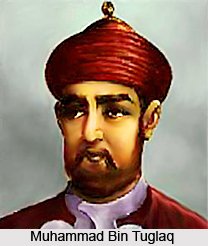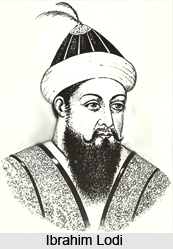 Administration of the Delhi Sultanate was based on the following of the laws of the Shariat or the laws of Islam. According to the Islam, Shariat is above everybody and every law and even the Imam or the Khalifa is under it. All Muslim rulers were governed by it and had to obey its laws. The Sultans of Delhi were no exception. Their primary duty was the observance of the laws of Shariat or Islamic laws in the matters of the state. Therefore the policy of the Delhi Sultanate was largely influenced by their religion.
Administration of the Delhi Sultanate was based on the following of the laws of the Shariat or the laws of Islam. According to the Islam, Shariat is above everybody and every law and even the Imam or the Khalifa is under it. All Muslim rulers were governed by it and had to obey its laws. The Sultans of Delhi were no exception. Their primary duty was the observance of the laws of Shariat or Islamic laws in the matters of the state. Therefore the policy of the Delhi Sultanate was largely influenced by their religion.
Central Administration of Delhi Sultanate
The central administration of the Delhi Sultanate consisted of the office of the Sultan. Other ministers like the naib, the vazir, Diwani-i-risalat, Dabir-i-khas, Ariz-i-mumalik, Sadr-us-Sudur, Qazi-ul-quzat and Barid-i-mumalika. Besides, there were also several other departments and the Sultan appointed their officers to carry on specific duties. The sultan was the head of the state and enjoyed unlimited powers in every sphere of state activity. The naib also enjoyed equivalent position as that of the Sultan. The vazir was the Prime Minister of the state and headed the financial department. Ariz-i-mumalik was the head of the department of diwani-i-arz and in that capacity was the controller-general of the military department. Diwani-i-risalat was the minister of foreign affairs and Sadr-us-Sudur was the head of the religious department. The Vakil-i-dar-mahal looked after the officials of the palace; the Barbak maintained the tradition of the court and its glamour; Amir- i-hajib looked after the visitors to the Sultan; Amir-i-shikar-i-shahi arranged for the hunting parties of the Sultan; Amir-i-majlis-shahi looked after the festivals of the state; and Sar-i-jahandar was the Sultan`s bodyguards.
Administration of Provinces of Delhi Sultanate
The empire of the Delhi Sultanate was divided into province foe the convenience of the administration. They were called Iqtas. The number of Iqtas was not fixed and there was no uniformity in their administration. The head of the Iqta was addressed by various names such as naib Sultan, nazim, muqti or wali. The walis or the muqtis enjoyed the same powers in relation to their Iqtas as the Sultan enjoyed in the Empire. Besides the muqti, there were other officers of the central government in every Iqta. There was a vazir, an ariz and a qazi in every Iqta. By the end of the 13th century there was no smaller administrative unit than Iqta. After that Iqtas were divided into smaller units called shiqqs, which were put under shiqqdars. The shiqqs were further divided into parganas.
Financial System of Delhi Sultanate
 The financial system was an important part of the administration of the Delhi Sultanate. Five categories of taxes were collected by the Sultan. Ushr was a land tax which was collected from the Muslim peasants. Kharaj was a land tax which was charged from the non Muslim peasants. Khams was one fifth of the booty captured in the war or one fifth of the produce of mines or buried treasure that was found. Jizya was a religious on the non Muslims. According to the Islam, a no Muslim had any right to dwell in the kingdom of a Muslim Sultan, but this concession was permitted after payment of the tax called Jizya. Zakat was a religious tax which was imposed only on rich Muslims and consisted of two and half percent of their income. The main items of expenditure were expenses on the army, salaries of civil officers and the personal expenditure of the Sultan and his palace.
The financial system was an important part of the administration of the Delhi Sultanate. Five categories of taxes were collected by the Sultan. Ushr was a land tax which was collected from the Muslim peasants. Kharaj was a land tax which was charged from the non Muslim peasants. Khams was one fifth of the booty captured in the war or one fifth of the produce of mines or buried treasure that was found. Jizya was a religious on the non Muslims. According to the Islam, a no Muslim had any right to dwell in the kingdom of a Muslim Sultan, but this concession was permitted after payment of the tax called Jizya. Zakat was a religious tax which was imposed only on rich Muslims and consisted of two and half percent of their income. The main items of expenditure were expenses on the army, salaries of civil officers and the personal expenditure of the Sultan and his palace.
Land Revenue System of Delhi Sultanate
Land revenue system of the Delhi Sultanate was based on the type and the measurement of the land. There were basically four kinds of lands. The central government appointed revenue collector in each sub division called the shiq. He collected the revenue with the help of the hereditary officers of the village like chaudharis, muqaddams, patwaris etc. normally the peasants were asked to pay one third of the produce as land revenue. Ala-ud-din however collected half of the total produce from certain territories. Mostly the revenue was collected in cash. Except Ala-ud-din Khilji and Muhammad Bin Tughlaq no sultan of Delhi collected revenue based on the measurement of land.
Military Administration of Delhi Sultanate
 The power of the sultan depended on the army. Therefore every Sultan was forced to keep a large army at the center. There were four types of soldiers in the army of the Delhi Sultanate. The soldiers who were recruited by the center as soldiers of the army of the Sultan, the soldiers who were employed on a permanent basis by nobles and provincial governors, the soldiers who were appointed only in the times of war on a temporary basis and the Muslim soldiers who joined the army as volunteers at the time of war against the Hindus. The army primarily consisted of cavalry, infantry and elephants. The army of the Sultan had soldiers of different nationalities and diverse faith. The Persians, the Afghans, the Mongols, the Indian Muslims and the Hindus but the higher offices were mostly given to foreign Muslims.
The power of the sultan depended on the army. Therefore every Sultan was forced to keep a large army at the center. There were four types of soldiers in the army of the Delhi Sultanate. The soldiers who were recruited by the center as soldiers of the army of the Sultan, the soldiers who were employed on a permanent basis by nobles and provincial governors, the soldiers who were appointed only in the times of war on a temporary basis and the Muslim soldiers who joined the army as volunteers at the time of war against the Hindus. The army primarily consisted of cavalry, infantry and elephants. The army of the Sultan had soldiers of different nationalities and diverse faith. The Persians, the Afghans, the Mongols, the Indian Muslims and the Hindus but the higher offices were mostly given to foreign Muslims.
Religious Policy of Delhi Sultanate
During the entire period of the Delhi Sultanate, Islam remained the religion of the state. The Sultan performed a religious duty along with his political obligation while administering the state. The duty was to convert the non Muslim territory into a Muslim land. Every Sultan pursued this aim according to his religious views, circumstances and powers. Sultans like Ala-ud-din Khilji and Muhammad Tughlaq considered it as their secondary duty but Sultans like Firoz Tughlaq and Sikandar Lodi gave it preference over their political obligations and left nothing in their efforts to propagate Islam among their subjects. Most Sultans pursued a discriminatory policy between their Muslim and non Muslim subjects, majority of them being the Hindus. They had to pay the religious tax, Jizya. Restrictions were imposed on the religious pilgrimages of the Hindus. Thus the policy of the Sultans was that of religious intolerance.
The administration of the Delhi Sultanate though suffered from a number of flaws yet it fulfilled the need of the time.



















